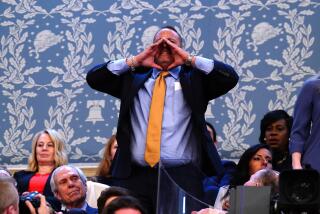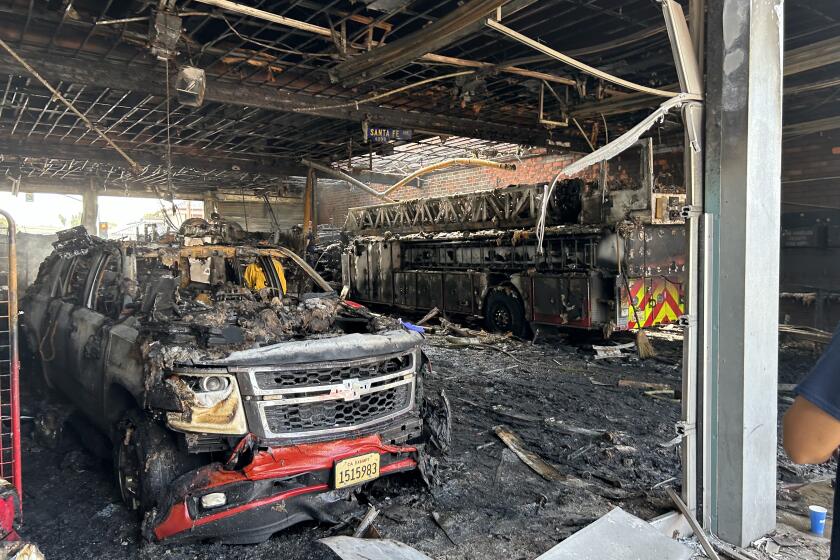Marine killed by explosion in Afghanistan
In a second-grade homework assignment, Stephen J. Dunning wrote about his future in a passage that would be as brief as it was portentous. He wanted to go to college and he wanted to become a United States Marine.
His father, Robert, who flew helicopters in the Marine Corps, hadn’t stopped to consider its meaning. But after his son’s death at age 31 on Oct. 27 in Afghanistan’s Helmand province, the elder Dunning said those words, accompanied by a crayon self-portrait on the faded page, took on new, touching significance.
“He was saying, ‘Hey, Dad, I want to be just like you,’ ” Robert Dunning said. “I didn’t realize what an impact it [my work] was having on him and that it was something he wanted to do, that the man he became was the kid he was.”
If Stephen’s goal wasn’t readily apparent to his father, that may have been in part because he was such a quiet, contemplative boy.
Dunning enjoyed problem solving, puzzles and working with his hands, including building models of the helicopters his dad flew. One of his favorite childhood pastimes was making origami cranes and using needles to make each paper figurine smaller and better than the previous one.
Dunning was soft-spoken but not lacking in confidence or compassion, his dad said. When a high school chum went to fulfill credit for community work with disabled children, Dunning tagged along and came away from the experience with a deep appreciation for helping others, a trait he would carry through into his military career.
In 1999, Dunning graduated from Milpitas High School and briefly enrolled in Mission College in Santa Clara before deciding he wanted to join the Marines.
Dunning, who would spend most of his career in Okinawa, Japan, specialized in calibrating and repairing electronics, including air traffic control computers. That background, combined with a cool-under- pressure demeanor, would serve him well in a new, far more dangerous job, that of explosive ordnance disposal technician.
Unlike the image of the space-suit-clad bomb technician portrayed in the Academy Award winning film “The Hurt Locker,” Dunning worked only with the protective gear he could carry to the bomb site, where he used tools and his hands to dig for wires and switches.
Adding to the danger was that Taliban soldiers would watch from the periphery, studying how their improvised explosives were dismantled so they could redesign them.
It was the full knowledge of those risks that led Dunning, during his down time, to teach fellow Marines the rudiments of how to recognize the IED threat.
“He could have watched movies if he wanted, got on the Internet or read a book,” said Dunning’s close friend Joshua Lee, who was assigned to the same unit as Dunning in Japan and served with him in Afghanistan in 2010 and again in 2011. “But Steve would take it upon himself to take the kids and go through everything on IEDs. He would show them, this is what you are looking for, this is how you can find them, this is how you can avoid them.”
Lee said his friend embodied the sentiments of a note he had once left behind for his brother, David, to “live a selfless life.”
“Steve embodied that 110%,” Lee said. “That was Steve.”
At the time of his death, Dunning was assigned to the 9th Engineer Support Battalion, 3rd Marine Logistics Group, 3rd Marine Expeditionary Force, based in Okinawa. He was killed when a booby trap connected to a device he had just disarmed exploded, his father said. Almost a month before his death, he had been promoted to staff sergeant.
Dunning was buried at the Pleasant Hill Baptist Church Cemetery in Eddyville, Ky.
He is survived by his parents, Robert and Tomoe Dunning of Milpitas; his brother, David Dunning of Milpitas; his sister, Joy, and her husband, B.J. Coy of Kirkland, Wash.; his grandparents, Jim and Olga Dunning of Kentucky, Marie and Carl Welch of Konawa, Okla., and Gary and Yoshiko Watson of Yokosuka, Japan; and his great-grandmother, Mary Watson of Everett, Wash.
More to Read
Start your day right
Sign up for Essential California for news, features and recommendations from the L.A. Times and beyond in your inbox six days a week.
You may occasionally receive promotional content from the Los Angeles Times.






